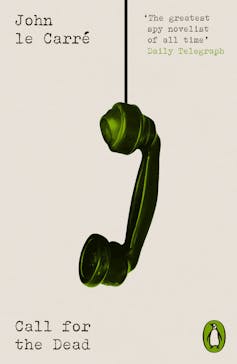George Smiley is unattractive, overweight, a terrible dresser – and a better spy than James Bond
- Written by Alexander Howard, Senior Lecturer, Discipline of English and Writing, University of Sydney

I grew up in the southeast of England. There wasn’t all that much to do. I remember spending a lot of time at the local cinema. You had to drive to get there. I watched pretty much anything I could.
Tom Cruise was excellent in Mission: Impossible[1]. Pierce Brosnan was equally great in GoldenEye[2] – James Bond careening through the streets of St Petersburg astride a tank. It was cool, it was funny, it was the mid-1990s.
These films also served as a visual reminder: the Cold War was a thing of the past. Communism was done and dusted, already an impossibly distant memory. The West was well and truly the best.
If I wasn’t watching films, I was reading books. I was not an especially discerning reader. James Joyce[3], Jilly Cooper[4]. I didn’t really mind.
There were a fair few books at my grandparents’ place, which I always thought of as home. This is where I discovered the work of John Le Carré. I remember being intrigued by the unusual name embossed in gold print on the cover of the volume I’d stumbled upon. It rang a bell: something to do with a secret world[5] of spies.
Here’s a taste of Le Carré’s prose:
When Lady Ann Sercomb married George Smiley towards the end of the war she described him to her astonished Mayfair friends as breathtakingly ordinary. When she left him two years later in favour of a Cuban motor racing driver, she announced enigmatically that if she hadn’t left him then, she never could have done; and Viscount Sawley made a special journey to his club to observe that the cat was out of the bag.
This is the opening paragraph of Le Carré’s debut novel, Call for the Dead[6]. Le Carré wrote the book while living in the same village my grandparents moved to a couple of decades later (Great Missenden).
Published in 1961, this novel ushered into existence the spymaster George Smiley.
Read more: Friday essay: the secret lives of Ian Fleming and John Le Carré – the spymasters shaped by a lack of parental love[7]
Instantly hooked on an unlikely hero
A composite based on several real people[8], George Smiley is Le Carré’s most beloved and influential literary creation. He has been portrayed on screen, to acclaim, by luminaries like Alec Guinness and Gary Oldman.
Guinness played Smiley in the famous 1979 television adaptation of the novel that might well be Le Carré’s masterpiece: Tinker, Tailor, Soldier, Spy[9], which celebrates its 50th birthday this year. In 2011, Oldman put in a commendable shift as Smiley in the well-received film adaptation.
In this iconic novel, Smiley hunts down a thinly fictionalised version of the infamous MI6 double agent, Kim Philby.
Gary Oldman played Smiley in the 2011 film adaptation of Tinker, Tailor, Soldier, Spy. The novel turns 50 this year.If not for Smiley, we would not have Jackson Lamb, the protagonist of Slow Horses – also, fittingly, played by Oldman in the ongoing televisual adaptation of Mick Herron’s Slough House series.
Read more: Best books of 2023: our experts share the books that have stayed with them[10]
Here’s how Le Carré introduces Smiley to his readers:
Short, fat, and of a quiet disposition, he appeared to spend a lot of money on really bad clothes, which hung about his squat frame like skin on a shrunken toad.
Economical, yet evocative. As an initial description, this surely ranks as one of the very best. I was instantly hooked: who was this man, and why describe him this way? And what on earth was going on with those really bad clothes?
Le Carré doesn’t directly address that last question in Call for the Dead. He explains instead that part of George Smiley died after Lady Ann left him:
The part of Smiley which survived was as incongruous to his appearance as love, or a taste for unrecognised poets: it was his profession, which was that of intelligence officer. It was a profession he enjoyed, and which mercifully provided him with colleagues equally obscure in character and origin. It also provided him with what he had once loved best in life: academic excursions into the mysteries of human behaviour, disciplined by the practical application of his own deductions.
Smiley works as an intelligence agent for the Circus, Le Carré’s fictionalised version of Britain’s MI6. Looks can deceive. Despite his undistinguished appearance, Smiley is incredibly good at what he does. This unlikely hero – part bureaucrat, part detective[11] – always gets things done, more often than not in the face of seemingly insurmountable odds.
Read more: 'The wilderness of mirrors': 70 years since the first James Bond book, spy stories are still blurring fact and fiction[12]
From the Cold War to Brexit
Smiley finds himself in a spot of bother at the start of Call for the Dead.

















